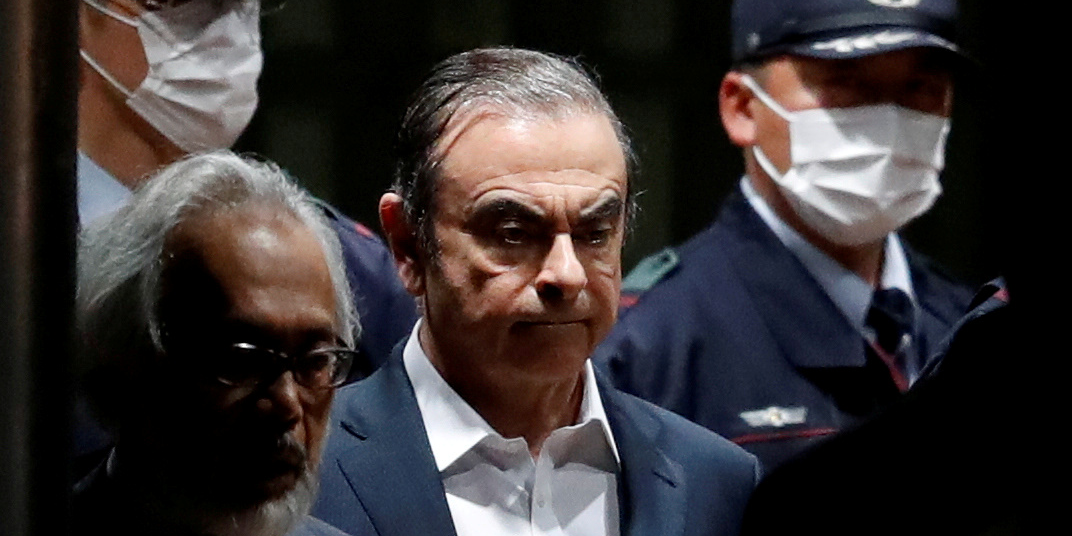- Former Nissan CEO Carlos Ghosn has fled to Lebanon from Japan, where he faced trial on financial-misconduct charges.
- It is unclear how Ghosn managed to leave Japan, where he had surrendered his passports after his arrest in November 2018.
- An official told Japan’s NHK broadcaster that there was no record of Ghosn leaving.
- According to reports in Lebanese media, Ghosn hid in a box meant for musical instruments to escape Japan.
- A source told The Wall Street Journal that Ghosn traveled to Lebanon via Turkey.
- Visit Business Insider’s homepage for more stories.
Extraordinary details are emerging of how former Nissan CEO Carlos Ghosn managed to flee to Lebanon from Japan, seemingly evading his prosecution there.
Ghosn was not supposed to have been able to leave Japan. He was barred from traveling abroad as part of a $13 million bail agreement he struck while awaiting trial on financial-misconduct charges.
Late on Monday, multiple news agencies reported that Ghosn had arrived in Lebanon, where he holds citizenship. The Middle Eastern country has no extradition treaty with Japan, meaning Japanese authorities will most likely struggle to get him back.
In a statement, Ghosn, who until his arrest was one of the most powerful figures in the auto industry, denied that he was fleeing justice. He instead said that his trial in Japan was rigged and that he was a victim of “political persecution.”
Ghosn said he would "no longer be held hostage by a rigged Japanese justice system where guilt is presumed, discrimination is rampant, and basic human rights are denied."
Immediately speculation swirled about how Ghosn - who was one of Japan's highest-profile criminal defendants - was able to leave the country, where his home was under video surveillance and his phone and computer use was tightly restricted.
His Japanese lawyer, Junichiro Hironaka, told The Wall Street Journal that he still has Ghosn's three passports, which he had surrendered after his arrest more than a year ago.
The executive holds French, Lebanese, and Brazilian citizenship. Japan's public broadcaster, NHK, reported that officials have no record of him departing the country and consider it possible that he left under a different name.
Lebanese news outlets saying Carlos Ghosn was smuggled out of Japan in a box designed for transporting musical instruments, this story is incredible https://t.co/5hxGBUSZhY
— Tom Gara (@tomgara) December 31, 2019
Lebanese media and former Financial Times editor Lionel Barber reported that Ghosn may have hidden in a box meant for musical instruments to flee Japan.
I can read a million words on how car boss Carlos Ghosn escaped 24 hour surveillance in Japan to flee by private jet to Lebanon. Beirut sources saying he hid in a box designed for a musical instrument. Double bass, presumably.
— Lionel Barber (@lionelbarber) December 31, 2019
Hironaka told the WSJ that it would have taken a "big organization" to arrange Ghosn's departure from Japan, but did not elaborate further.
According to a report in Lebanese media, Ghosn arrived at a Beirut airport in a private jet. A source told The Wall Street Journal that he had arrived in the country via Turkey.
Data from flight tracking website flightradar24 shows a private plane leaving Osaka, Japan, and travelling to Istanbul, Turkey, on the day of Ghosn's escape.
Ghosn was arrested in November 2018, and fired by Nissan days later.
Before his downfall he had been lauded for helping bring the carmaker back from the brink of bankruptcy, and for helping to forge a partnership between Nissan and Renault.
He is accused by prosecutors of enriching himself with payments to dealerships in the Middle East, and falsifying his income.
He has denied the charges, and spent 108 days in jail before being released on bail in April.

